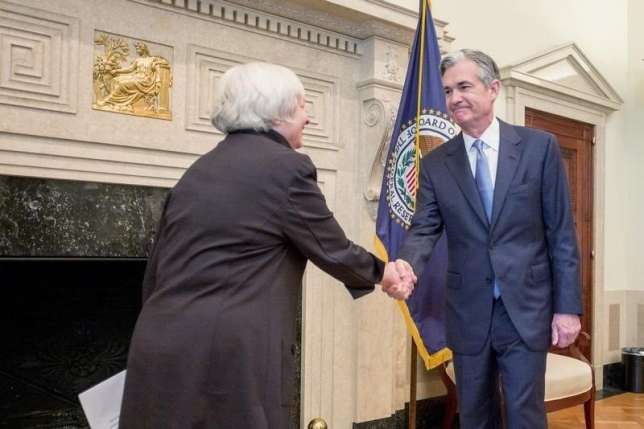
The U.S. Senate Tuesday confirmed Jerome Powell, lawyer, and multi-millionaire, as the next head of the Federal Reserve, the country’s central bank, succeeding Janet Yellen.
His appointment approval has been hailed a move likely to provide continuity in U.S. monetary policy, which oversaw the economy growing for nine years straight.
Powell has served on the Fed’s board since 2012 and is expected to take over when Yellen leaves her post on February 3, 2018. Among the candidates President Trump was considering, Powell, a 64-year-old lawyer, was seen as a safe choice, who would provide continuity for existing US monetary policy and not rattle markets.
Analysts regard him as a status quo candidate, likely to continue the Fed’s current policies of gradually raising interest rates. This appointment will mark the end of the long tradition that presidents stick with the Federal Reserve chair they meet in charge when they take office.
The Republican-controlled Senate voted 84-13 to approve the 64-year-old lawyer to a four-year term as Fed chair beginning early next month.
It was the most lopsided of recent Fed chair votes, signaling both Powell’s bipartisan appeal and the ebbing of some of the tensions raised by the central bank’s aggressive response to the 2007-2009 financial crisis and recession.
Controversy over those Fed policies led to a narrower 56-26 vote margin when Yellen became chair in 2013, and a 70-30 vote when former chair Ben Bernanke was named to a second term.
Powell will be “central to ensuring a safe and sound financial system while supporting a vibrant, growing economy,” banking committee chairman and Idaho Republican Mike Crapo said on the Senate floor. “He will play a key role in rightsizing federal regulations and alleviating unnecessary burdens.”
Powell takes over as chair with U.S. monetary policy on a steady course toward gradually higher interest rates and a smaller balance sheet.
Read also: World top bankers, economists, investors warn of next global financial crisis in Davos
He has been supportive of gradual interest rate rises and of the consensus that the Fed should slowly decrease the asset holdings it gathered as part of its efforts to battle the financial crisis and the Banking committee chairman Mike Crapo, a Republican, also made mention that Powell would be “central to ensuring a safe and sound financial system while supporting a vibrant, growing economy” but Senator Elizabeth Warren, a Democrat, didn’t agree with that, she said the Fed chair needed to be someone who would stand up to Wall Street, adding that Mr Powell was not that person.
However, a debate is brewing within the central bank about whether it needs to rethink its approach to inflation and whether the recent massive tax overhaul legislation will affect the U.S. economy.
Powell must also decide how far to accommodate a push by the Trump administration to roll back some post-crisis financial regulations.
The potential for financial deregulation advocated by the Trump administration prompted the most pointed opposition to Powell, a former executive at the Carlyle Group private equity firm whose credentials as Fed chair are rooted in his understanding of markets. Powell is not an economist by training.
In its last meeting for 2017, the Federal Reserve decided to hike its federal funds rate target range by a quarter point to 1.25%-1.50%. The central bank also hinted at future rate hikes.
“The Committee expects that economic conditions will evolve in a manner that will warrant gradual increases in the federal funds rate; the federal funds rate is likely to remain, for some time, below levels that are expected to prevail in the longer run,” said the FOMC statement.








